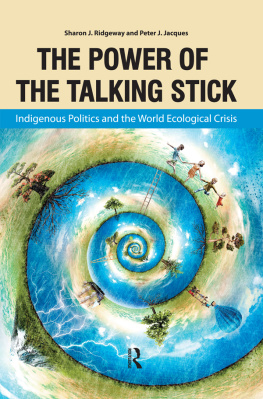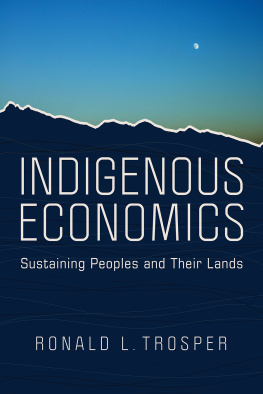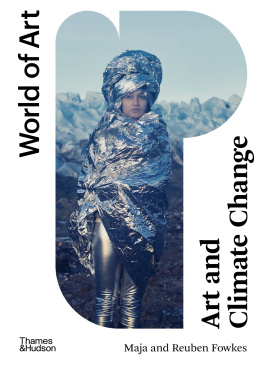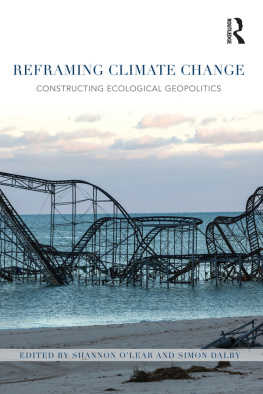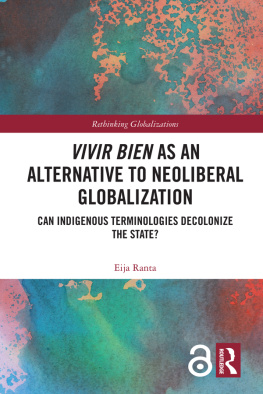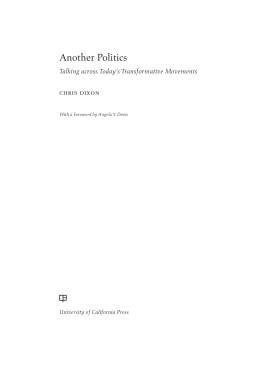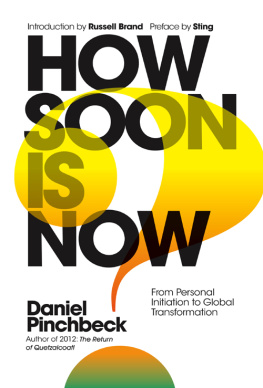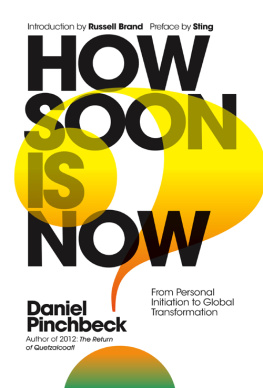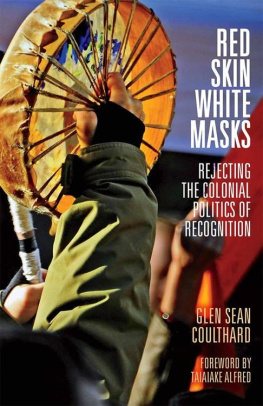First published 2014 by Paradigm Publishers
Published 2016 by Routledge
2 Park Square, Milton Park, Abingdon, Oxon OX14 4RN
711 Third Avenue, New York, NY 10017, USA
Routledge is an imprint of the Taylor & Francis Group, an informa business
Copyright 2014, Taylor & Francis.
All rights reserved. No part of this book may be reprinted or reproduced or utilised in any form or by any electronic, mechanical, or other means, now known or hereafter invented, including photocopying and recording, or in any information storage or retrieval system, without permission in writing from the publishers.
Notice:
Product or corporate names may be trademarks or registered trademarks, and are used only for identification and explanation without intent to infringe.
Library of Congress Cataloging-in-Publication Data
Ridgeway, Sharon J.
The power of the talking stick : indigenous politics and the world ecological crisis /
Sharon J. Ridgeway and Peter J. Jacques.
pages cm
Includes bibliographical references and index.
ISBN 978-1-61205-290-8 (hardcover : alk. paper)
1. Indigenous peoplesEcology. 2. Traditional ecological knowledge.
3. Indigenous peoplesPolitics and government. I. Title.
GF50.R54 2013
363.7dc23
2013012879
Designed and Typeset by Straight Creek Bookmakers.
ISBN 13: 978-1-61205-290-8 (hbk)
ISBN 13: 978-1-61205-291-5 (pbk)
The Mikmaw people of contemporary Nova Scotia, Canada, have a tradition of using a talking stick, and this tool is used to ensure that anyone who has something to say is given the space and deference to do so.
In American Indian Quarterly, Laura Donaldson describes it this way:
Our Mikmaw ancestors used the Talking Stick to guarantee that everyone who wanted to speak would have a chance to be heard and that they would be allowed to take as long as they needed to say what was on their minds without fear of being interrupted with questions, criticisms, lectures or scoldings, or even of being presented with solutions to their problems. An ordinary stick of any kind or size is used. The person who has a problem or issue holds the Talking Stick and relates everything pertaining to it, especially everything they have done to solve it. After they are through, they pass the stick to the person on their left, following the suns direction. The next person, Nekm [the Mikmaw word for the next person], states everything they know about the problem without repeating anything that was already said. The Talking Stick goes around until it returns to the person with the problem or issue, who then acknowledges everyone present and what they have said.
Donaldson notes that the talking stick is an important facet of Mikmaw oral tradition, where deliberation and discussion, not the pen or the dictate, shaped social decisions. These discussions had to happen in smaller-scale groups than a nation-state or province, but it is a good starting point for thinking about fair and just deliberation as well as some of the lessons that Indigenous The Sixth Great Extinction is a reference to the current extinction wave, which follows five other waves of extinction, such as the one that eliminated the dinosaurs, across the history of the biosphere.
We then ask that the power of this system be confronted, and that we allow for others to speakand be heard. Indigenous peoples around the world have been mobilizing in a world social movement, calling attention to the global environmental threats to humanity, and to nonhumans. Few appear to be listening, perhaps because, if taken seriously, these voices could inspire broad social changes for the better that would be more cautious, less economically focused, and more sustainable. If the international community does not take Indigenous voices seriously, we risk throwing the human family into radical miseryjoining many of our nonhuman families who already are suffering profound loss. The idea for this book was initiated by a dream one of the authors (Peter) had while traveling in the Intermountain West of the United States.
Peter was traveling with his two daughters, Olivia and Lily, taking them to see their family in Colorado, New Mexico, and Idaho. On the way back to Arizona, they stayed in a little family-run motel in southern Utah. That morning, he had a dream that interrupted his thinking about the human prospect. This dream was perhaps unlike any dream he had ever hadit was suffused with a profound sense of urgency and clarity.
In the dream, I am watching people learn acrobatics and hang-gliding. Just like at a circus or a carnival, there was a giant safety net for the acrobats, who are bouncing very high. Some of the acrobats were permanently upside down, and they had painted faces or masks, some had jester-type hats on, and they all had colorful leotards of green, white, and reddish orange. There is a fence that people are standing in a circle around, on top of, and some are standing on the feet of the upside-down people. I think to myself that must be uncomfortable for the upside-down people. I want to try it bouncing on the net and doing acrobatics too, but I am not given the space and I eventually lose my turn.
Later, I am at an American Indian jazz jam session in a large room. The jazz players were here in part because they had been excluded from the circus and had come here to do their own thing.
I am given a coat from a medicine man to hold. His name is Scott. I took the coat without realizing that it could hurt me because it held powerful medicine. However, he makes it clear that he will not hurt me with it.
The jazz session is over, and there is a heretofore unnoticed group of people who did not get to play. They have on the same leotards and costumes from the circus/carnival. They are demonic and mean to destroy us.
I hear Scott calling for his jacket, but I cannot find him. I accidently give it to another medicine man who is sleeping, but I take it back immediately. I knew the sleeping medicine man but cannot place him. I know we are in danger. I think I finally find Scott and return his jacket, but at this point I am a point-person for a quickly forming battle. The demonic carnival players were moving to destroy everyone from the jazz session and myself. We are now in a desert area with pinion and juniper trees, sage brush, and tumbleweeds. The earththe soilis red.
I face the demonic group, and I howl an unfamiliar sound that surprises me. I metamorphose into a white wolf. Then, I look behind me, and out from behind the sage and trees, tens of hundreds of wolves emerge, and we are one force. The sinister band also turns into wolves, and we fight them. They are preternaturally strong, but we know that this is not a simple battle but one upon which the future of life on Earth hangs. Together, we eventually defeat them. Someone says I had been bitten and my vision faded to black, but apparently I survived. I woke at this point.
I know this dream, like many dreams, sounds more than a little crazy. However, like many other dreams, I had my own sense of what the strange events meant. I knew immediately that I was being called to action to help defend the Earth against horrific forces. I believed that the carnival players were symbolic forces from the real world who wanted to distract us from the unfolding destruction of the Earth they were driving, and, as a person who was part of the group at the circus and who wanted to participate, I was complicit with, if not one of them. The American Indian jazz players and Scott were representations of wisdom and power of Indigenous peoples, though they had been cast out of the center of power, represented by the circus in my dream. Finally, I knew that the wolves were an authentic representation of fierce resistance, and that through my metamorphosis I discovered that we are not alone.

